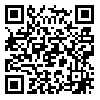Volume 1, Issue 3 (11-2024)
EKD 2024, 1(3): 1-25 |
Back to browse issues page
Download citation:
BibTeX | RIS | EndNote | Medlars | ProCite | Reference Manager | RefWorks
Send citation to:



BibTeX | RIS | EndNote | Medlars | ProCite | Reference Manager | RefWorks
Send citation to:
Farasatkhah M. Iranian Researchers' experience of the Effectiveness for Sustainable Development in mission-oriented Institutions of Higher Education; fear and trembling between internal competencies and external realities. EKD 2024; 1 (3) :1-25
URL: http://jud.irphe.ac.ir/article-1-89-en.html
URL: http://jud.irphe.ac.ir/article-1-89-en.html
IRPHE
Abstract: (2254 Views)
Higher education studies have not been able to improve the policy system of the country and its role in the sustainable development. A grounded research method was applied for understanding the dimensions and roots of this problem. The lived experience of 32 faculty members was referred to in mission-oriented institutions focused on the policy studies of the scientific and university system and higher education; with variations in gender, academic rank, expertise, employment status, interests, different fields of activity and scientific work style. The application of the CCDA technique led to a paradigm model for exploring the lived experiences of these researchers in the target institutions. Researchers take on behavioral tactics in a dual border situation between external realities and internal competencies. They take different strategies in their research life. Groups of variables intervene during this process, the most important of which is the researchers' aquired competences which were represented in five main groups. Each of them has characteristics that have been described in detail. By analyzing the competency and effectiveness matrix, four modes were obtained which are at their optimal point, researchers' competencies lead to social effectivness for sustainable development. For about 60 types of strategies that researchers undertake, an approximate quantitative average value (on a scale of 100) was estimated in terms of the probability of social effectiveness. The highest value is 100 and the lowest is 4. Considering the diversity of the stakeholders (about 40 types in 10 clusters), unexplored ways are still in front of researchers in this field.
Keywords: Policy studies, Higher Education, Researchers, Strategies, Effectiveness, Sustainable Development, Stakeholders
Type of Study: Research |
Subject:
General
Received: 2022/09/19 | Accepted: 2023/04/9 | Published: 2024/11/2
Received: 2022/09/19 | Accepted: 2023/04/9 | Published: 2024/11/2
Send email to the article author
| Rights and permissions | |
 |
This work is licensed under a Creative Commons Attribution-NonCommercial 4.0 International License. |


